- Home
- Jr. Horatio Alger
Helping Himself; Or Grant Thornton's Ambition Page 2
Helping Himself; Or Grant Thornton's Ambition Read online
Page 2
"That is good. All you will have to do will be to present yourselffor examination. I shall see you through, as I have promised."
"You are very kind, Uncle Godfrey," said Grant; and then hehesitated.
"It's Thornton family pride, Grant. I want my nephew to be somebody.I want you to be a professional man, and take a prominent place inthe world."
"Can't I be somebody without becoming a professional man, or---"
"Or, what?" asked his uncle, abruptly.
"Getting a college education?" continued Grant.
"What does this mean?" asked the old lawyer, knitting his brow."You're not getting off the notion of going to college, I hope?"
"I should like to go to college, uncle."
"I'm glad to hear that," said Godfrey Thornton, relieved. "I thoughtyou might want to grow up a dunce, and become a bricklayer orsomething of that kind."
Somehow Grant's task began to seem more difficult than he hadanticipated.
"But," continued Grant, summoning up his courage, "I am afraid itwill be rather selfish."
"I can't say I understand you, Grant. As long as I am willing to payyour college bills, I don't see why there is anything selfish inyour accepting my offer."
"I mean as regards father and mother."
"Don't I take you off their hands? What do you mean?"
"I mean this, Uncle Godfrey," said Grant, boldly, "I ought to be atwork earning money to keep them. Father's income is very small,and--"
"You don't mean to say you want to give up going to college?" saidGodfrey Thornton, hastily.
"I think I ought to, uncle."
"Why?"
"So that I can find work and help father along. You see, I should befour years in college, and three years studying a profession, andall that time my brother and sister would be growing older and moreexpensive, and father would be getting into debt."
Uncle Godfrey's brow wore a perceptible frown.
"Tell me who has put this idea into your head?" he said. "I am sureit isn't your father."
"No one put it into my head, Uncle Godfrey. It's my own idea."
"Humph! old heads don't grow on young shoulders, evidently. You area foolish boy, Grant. With a liberal education you can do somethingfor your family."
"But it is so long to wait," objected Grant.
"It will be a great disappointment to me to have you give up goingto college, but of course I can't force you to go," said his uncle,coldly. "It will save me three hundred dollars a year for fouryears-I may say for seven, however. You will be throwing away agrand opportunity."
"Don't think I undervalue the advantage of a college training,uncle," said Grant, eagerly. "It isn't that. It's because I thoughtI might help father. In fact, I wanted to make a proposal to you."
"What is it?"
"You say it will cost three hundred dollars a year to keep me incollege?"
"Well?"
"Would you be willing to give father two hundred a year for the nextfour years, and let me take care of myself in some business place?"
"So this is your proposal, is it?"
"Yes, sir."
"All I have got to say is, that you have got uncommon assurance. Youpropose to defeat my cherished plan, and want me to pay two hundreddollars a year in acknowledgment of your consideration."
"I am sorry you look upon it in that light, Uncle Godfrey."
"I distinctly decline your proposal. If you refuse to go to college,I wash my hands of you and your family. Do you understand that?"
"Yes, Uncle Godfrey," answered Grant, crestfallen.
"Go home and think over the matter. My offer still holds good. Youcan present yourself at college in September, and, if you areadmitted, notify me."
The lawyer turned back to his writing, and Grant understood that theinterview was over.
In sadness he started on his return walk from Somerset. He hadaccomplished nothing except to make his uncle angry. He could notmake up his mind what to do.
He had walked about four miles when his attention was sharply drawnby a cry of terror. Looking up quickly, he saw a girl of fourteenflying along the road pursued by a drunken man armed with a bigclub. They were not more than thirty feet apart, and the situationwas critical.
Grant was no coward, and he instantly resolved to rescue the girl ifit were a possible thing.
CHAPTER IV -- A TIMELY RESCUE
"I will save her if I can," said Grant to himself.
The task, however, was not an easy one. The drunken man was tall andstrongly made, and his condition did not appear to interfere withhis locomotion. He was evidently half crazed with drink, and hispursuit of the young girl arose probably from a blind impulse; butit was likely to be none the less serious for her. Grant saw at oncethat he was far from being a match for the drunkard in physicalstrength. If he had been timid, a regard for his personal safetywould have led him to keep aloof. But he would have despised himselfif he had not done what he could for the girl--stranger though shewas--who was in such peril.
It chanced that Grant had cut a stout stick to help him on his way.This suggested his plan of campaign. He ran sideways toward thepursuer, and thrust his stick between his legs, tripping him up. Theman fell violently forward, and lay as if stunned, breathingheavily. Grant was alarmed at first, fearing that he might beseriously hurt, but a glance assured him that his stupor was chieflythe result of his potations.
Then he hurried to overtake the girl, who, seeing what had takenplace, had paused in her flight.
"Don't be frightened," said Grant. "The man can't get up at present.I will see you home if you will tell me where you live."
"I am boarding at Mrs. Granger's, quarter of a mile back, mamma andI," answered the girl, the color, temporarily banished by fright,returning to her cheeks.
"Where did you fall in with this man?" inquired Grant.
"I was taking a walk," answered the girl, "and overtook him. I didnot take much notice of him at first, and was not aware of hiscondition till he began to run after me. Then I was almostfrightened to death, and I don't think I ever ran so fast in mylife."
"You were in serious danger. He was fast overtaking you."
"I saw that he was, and I believe I should have dropped if you hadnot come up and saved me. How brave you were!"
Grant colored with pleasure, though he disclaimed the praise.
"Oh, it was nothing!" he said, modestly. "But we had better start atonce, for he may revive."
"Oh, let us go then," exclaimed the girl in terror, and, hardlyknowing what she did, she seized Grant's arm. "See, he is beginningto stir. Do come quickly!"
Clinging to Grant's arm, the two hastened away, leaving theinebriate on the ground.
Grant now had leisure to view more closely the girl he had rescued.She was a very pretty girl, a year or two younger than himself, witha bright, vivacious manner, and her young rescuer thought her veryattractive.
"Do you live round here?" she asked.
"I live in Colebrook, the village close by. I was walking fromSomerset."
"I should like to know the name of the one who has done me so greata service."
"We will exchange names, if you like," said Grant, smiling. "My nameis Grant Thornton. I am the son of Rev. John Thornton, who isminister in Colebrook."
"So you are a minister's son. I have always heard that minister'ssons are apt to be wild," said the girl, smiling mischievously.
"I am an exception," said Grant, demurely.
"I am ready to believe it," returned his companion. "My name isCarrie Clifton; my mother is a minister's daughter, so I have aright to think well of ministers' families."
"How long have you been boarding in this neighborhood, Miss Carrie?"
"Only a week. I am afraid I shan't dare to stay here any longer."
"It is not often you would meet with such an adventure as this. Ihope you won't allow it to frighten you away."
"Do you know that drunken man? Does he live nearby?"
"I think he is
a stranger--a tramp. I never saw him before, and Iknow almost everybody who lives about here."
"I am glad he doesn't live here."
"He will probably push on his way and not come this way again duringthe summer."
"I hope you are right. He might try to revenge himself on you fortripping him up."
"I don't think he saw me to recognize me. He was so drunk that hedidn't know what he was about. When he gets over his intoxication heprobably won't remember anything that has happened."
By this time they had reached the gate of the farmhouse where Carriewas boarding, and Grant prepared to leave her.
"I think you are safe now," he said.
"Oh, but I shan't let you go yet," said the girl. "You must come inand see mother."
Grant hesitated, but he felt that he should like to meet the motherof a young lady who seemed to him so attractive, and he allowedhimself to be led into the yard. Mrs. Clifton was sitting in arustic chair under a tree behind the house. There Grant and hiscompanion found her. Carrie poured forth her story impetuously, andthen drawing Grant forward, indicated him as her rescuer.
Her mother listened with natural alarm, shuddering at the peril fromwhich her daughter had so happily escaped.
"I cannot tell how grateful I am to you for the service you havedone my daughter," she said, warmly. "You are a very brave boy.There is not one in ten who would have had the courage to act as youdid."
"You praise me more than I deserve, Mrs. Clifton. I saw the man wasdrunk, and I did not really run much risk in what I did. I am verythankful that I was able to be of service to Miss Carrie."
"It is most fortunate that you were at hand. My daughter might havebeen killed."
"What do you think, mother? He is a minister's son," said Carrie,vivaciously.
"That certainly is no objection in my eyes," said Mrs. Clifton,smiling, "for I am a minister's daughter. Where does your fatherpreach?"
"His church is only a mile distant, in the village."
"I shall hear him, then, next Sunday. Last Sunday Carrie and I wereboth tired, and remained at home, but I have always been accustomedto go to church somewhere."
"Papa will be here next Sunday," said Carrie. "He can only comeSaturday night on account of his business."
"Does he do business in New York?" asked Grant.
"Yes; his store is on Broadway."
"We live on Madison Avenue, and whenever you are in the city weshall be very glad to have you call," said Mrs. Clifton, graciously.
"Thank you; I should like to call very much," answered Grant, whowas quite sincere in what he said. "But I don't often go to NewYork."
"Perhaps you will get a place there some time," suggested Carrie.
"I should like to," replied Grant.
"Then your father does not propose to send you to college?" It wasMrs. Clifton who said this.
"He wishes me to go, but I think I ought to go to work to help him.He has two other children besides me."
"Is either one a girl?" asked Carrie.
"Yes; I have a sister of thirteen, named Mary."
"I wish you would bring her here to see me," said Carrie. "I haven'tgot acquainted with any girls yet."
Mrs. Clifton seconded the invitation, and Grant promised that hewould do so. In fact, he was pleased at the opportunity it wouldgive him of improving his acquaintance with the young lady from NewYork. He returned home very well pleased with his trip to Somerset,though he had failed in the object of his expedition.
CHAPTER V -- MRS. THORNTON'S PEARLS
The next Sunday Mrs. Clifton and her daughter appeared at church,and Grant had the pleasure of greeting them. He was invited with hissister to take supper with them on the next Monday afternoon, andaccepted the invitation. About sunset he met his new friendswalking, with the addition of the husband and father, who, comingSaturday evening from New York, had felt too fatigued to attendchurch. Mr. Clifton, to whom he was introduced, was a portly man inmiddle life, who received Grant quite graciously, and made forhimself acknowledgment of the service which our hero had renderedhis daughter.
"If I ever have the opportunity of doing you a favor, MasterThornton, you may call upon me with confidence," he said.
Grant thanked him, and was better pleased than if he had received animmediate gift.
Meanwhile Deacon Gridley kept his promise, and advanced the ministerfifty dollars, deducting a month's interest. Even with thisdeduction Mrs. Thornton was very glad to obtain the money. Part ofit was paid on account to Mr. Tudor, and silenced his importunitiesfor a time. As to his own plans, there was nothing for Grant to doexcept to continue his studies, as he might enter college after all.
If any employment should offer of a remunerative character, he feltthat it would be his duty to accept it, in spite of his uncle'sobjections; but such chances were not very likely to happen while heremained in the country, for obvious reasons.
Three weeks passed, and again not only Mr. Tudor, but anothercreditor, began to be troublesome.
"How soon is your father going to pay up his bill?" asked Tudor,when Grant called at the store for a gallon of molasses.
"Very soon, I hope," faltered Grant.
"I hope so, too," answered the grocer, grimly.
"Only three weeks ago I paid you thirty-three dollars," said Grant.
"And you have been increasing the balance ever since," said Tudor,frowning.
"If father could get his salary regularly--" commenced Grant.
"That's his affair, not mine," rejoined the grocer. "I have to paymy bills regular, and I can't afford to wait months for my pay."
Grant looked uncomfortable, but did not know what to say.
"The short and the long of it is, that after this week your fathermust either pay up his bill, or pay cash for what articles he getshereafter."
"Very well," said Grant, coldly. He was too proud to remonstrate.Moreover, though he felt angry, he was constrained to admit that thegrocer had some reason for his course.
"Something must be done," he said to himself, but he was not wiseenough to decide what that something should be.
Though he regretted to pain his mother, he felt obliged to report toher what the grocer had said.
"Don't be troubled, mother," he said, as he noticed the shade ofanxiety which came over her face. "Something will turn up."
Mrs. Thornton shook her head.
"It isn't safe to trust to that, Grant," she said; "we must helpourselves."
"I wish I knew how," said Grant, perplexed.
"I am afraid I shall have to make a sacrifice," said Mrs. Thornton,not addressing Grant, but rather in soliloquy.
Grant looked at his mother in surprise. What sacrifice could sherefer to? Did she mean that they must move into a smaller house, andretrench generally? That was all that occurred to him.
"We might, perhaps, move into a smaller house, mother," said he,"but we have none too much room here, and the difference in rentwouldn't be much."
"I didn't mean that, Grant. Listen, and I will tell you what I domean. You know that I was named after a rich lady, the friend of mymother?"
"I have heard you say so."
"When she died, she left me by will a pearl necklace and pearlbracelets, both of very considerable value."
"I have never seen you wear them, mother."
"No; I have not thought they would be suitable for the wife of apoor minister. My wearing them would excite unfavorable comment inthe parish."
"I don't see whose business it would be," said Grant, indignantly.
"At any rate, just or not, I knew what would be said," Mrs. Thorntonreplied.
"How is it you have never shown the pearl ornaments to me, mother?"
"You were only five years old when they came to me, and I laid themaway at once, and have seldom thought of them since. I have beenthinking that, as they are of no use to me, I should be justified inselling them for what I can get, and appropriating the proceedstoward paying your father's debts."
"How mu
ch do you think they are worth, mother?"
"A lady to whom I showed them once said they must have cost fivehundred dollars or more."
Grant whistled.
"Do you mind showing them to me, mother?" he asked.
Mrs. Thornton went upstairs, and brought down the pearl necklace andbracelets. They were very handsome and Grant gazed at them withadmiration.
"I wonder what the ladies would say if you should wear them to thesewing circle," he said, humorously.
"They would think I was going over to the vanities of this world,"responded his mother, smiling. "They can be of no possible use to menow, or hereafter, and I believe it will be the best thing I can doto sell them."
"Where can you sell them? No one here can afford to buy them."
"They must be sold in New York, and I must depend upon you to attendto the business for me."
"Can you trust me, mother? Wouldn't father--"
"Your father has no head for business, Grant. He is a learned man,and knows a great deal about books, but of practical matters heknows very little. You are only a boy, but you are a very sensibleand trustworthy boy, and I shall have to depend upon you."
"I will do the best I can, mother. Only tell me what you want me todo."
"I wish you to take these pearls, and go to New York. You can find apurchaser there, if anywhere. I suppose it will be best to take themto some jewelry store, and drive the best bargain you can."

 Adrift in New York: Tom and Florence Braving the World
Adrift in New York: Tom and Florence Braving the World Do and Dare — a Brave Boy's Fight for Fortune
Do and Dare — a Brave Boy's Fight for Fortune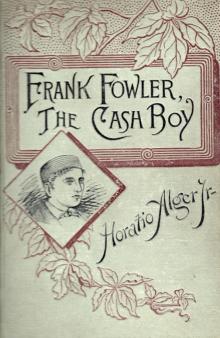 The Cash Boy
The Cash Boy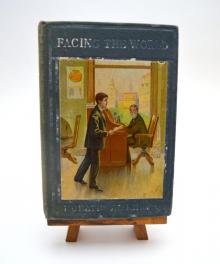 Facing the World
Facing the World The Young Explorer; Or, Claiming His Fortune
The Young Explorer; Or, Claiming His Fortune The Store Boy
The Store Boy Frank's Campaign; Or, The Farm and the Camp
Frank's Campaign; Or, The Farm and the Camp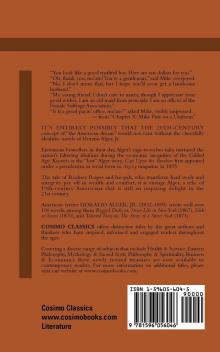 Cast Upon the Breakers
Cast Upon the Breakers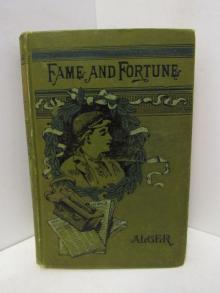 Fame and Fortune; or, The Progress of Richard Hunter
Fame and Fortune; or, The Progress of Richard Hunter The Errand Boy; Or, How Phil Brent Won Success
The Errand Boy; Or, How Phil Brent Won Success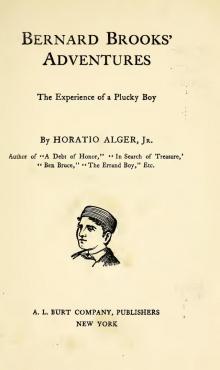 Bernard Brooks' Adventures: The Experience of a Plucky Boy
Bernard Brooks' Adventures: The Experience of a Plucky Boy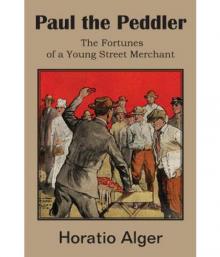 Paul the Peddler; Or, The Fortunes of a Young Street Merchant
Paul the Peddler; Or, The Fortunes of a Young Street Merchant Brave and Bold; Or, The Fortunes of Robert Rushton
Brave and Bold; Or, The Fortunes of Robert Rushton Try and Trust; Or, Abner Holden's Bound Boy
Try and Trust; Or, Abner Holden's Bound Boy Phil, the Fiddler
Phil, the Fiddler In A New World; or, Among The Gold Fields Of Australia
In A New World; or, Among The Gold Fields Of Australia Paul Prescott's Charge
Paul Prescott's Charge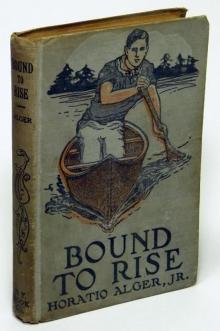 Joe's Luck; Or, Always Wide Awake
Joe's Luck; Or, Always Wide Awake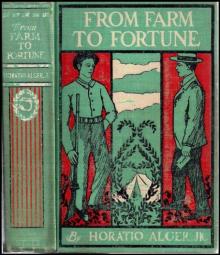 From Farm to Fortune; or, Nat Nason's Strange Experience
From Farm to Fortune; or, Nat Nason's Strange Experience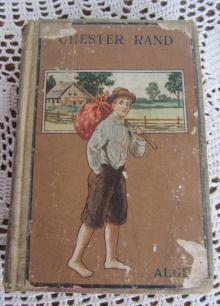 Chester Rand; or, The New Path to Fortune
Chester Rand; or, The New Path to Fortune Driven from Home; Or, Carl Crawford's Experience
Driven from Home; Or, Carl Crawford's Experience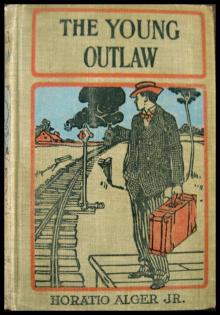 The Young Outlaw; or, Adrift in the Streets
The Young Outlaw; or, Adrift in the Streets Risen from the Ranks; Or, Harry Walton's Success
Risen from the Ranks; Or, Harry Walton's Success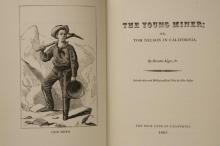 The Young Miner; Or, Tom Nelson in California
The Young Miner; Or, Tom Nelson in California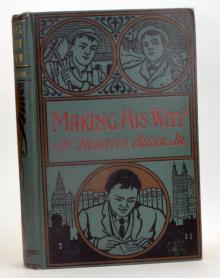 Making His Way; Or, Frank Courtney's Struggle Upward
Making His Way; Or, Frank Courtney's Struggle Upward Ben, the Luggage Boy; Or, Among the Wharves
Ben, the Luggage Boy; Or, Among the Wharves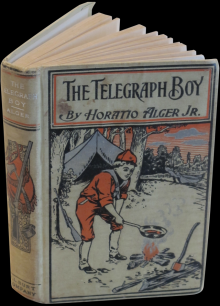 The Telegraph Boy
The Telegraph Boy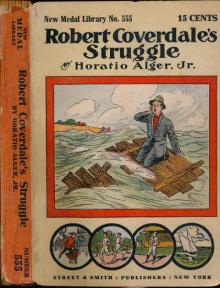 Robert Coverdale's Struggle; Or, on the Wave of Success
Robert Coverdale's Struggle; Or, on the Wave of Success Rufus and Rose; Or, The Fortunes of Rough and Ready
Rufus and Rose; Or, The Fortunes of Rough and Ready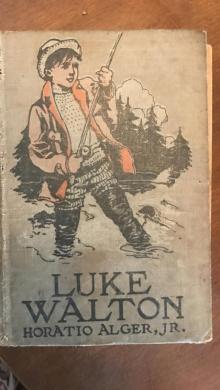 Luke Walton
Luke Walton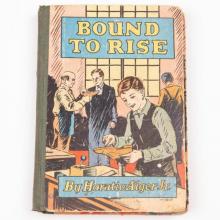 Mark Mason's Victory: The Trials and Triumphs of a Telegraph Boy
Mark Mason's Victory: The Trials and Triumphs of a Telegraph Boy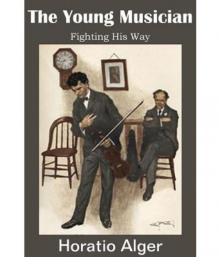 The Young Musician; Or, Fighting His Way
The Young Musician; Or, Fighting His Way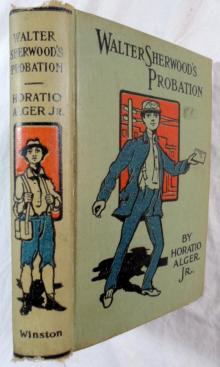 Walter Sherwood's Probation
Walter Sherwood's Probation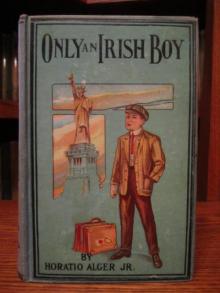 Only an Irish Boy; Or, Andy Burke's Fortunes
Only an Irish Boy; Or, Andy Burke's Fortunes Slow and Sure: The Story of Paul Hoffman the Young Street-Merchant
Slow and Sure: The Story of Paul Hoffman the Young Street-Merchant Herbert Carter's Legacy; Or, the Inventor's Son
Herbert Carter's Legacy; Or, the Inventor's Son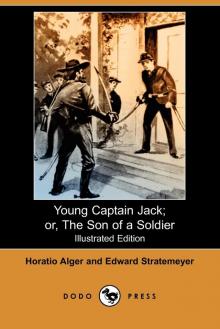 Young Captain Jack; Or, The Son of a Soldier
Young Captain Jack; Or, The Son of a Soldier Timothy Crump's Ward: A Story of American Life
Timothy Crump's Ward: A Story of American Life Hector's Inheritance, Or, the Boys of Smith Institute
Hector's Inheritance, Or, the Boys of Smith Institute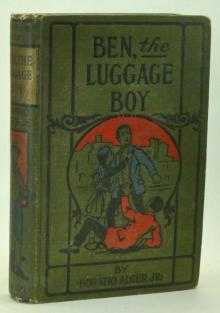 Ben's Nugget; Or, A Boy's Search For Fortune
Ben's Nugget; Or, A Boy's Search For Fortune